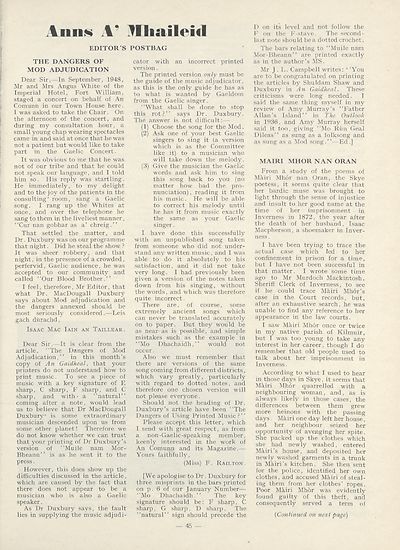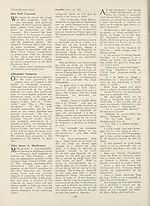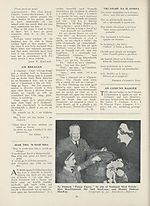An Comunn Gàidhealach Publications > Gaidheal > Volumes 44--45, January 1949--December 1950
(349) Page 45
Download files
Complete book:
Individual page:
Thumbnail gallery: Grid view | List view

A iiiiw A* Mliailciil
EDITOR’S POSTBAG
THE DANGERS OF
MOD ADJUDICATION
Dear Sir,—In September, 1948,
Mr and Mrs Angus White of the
Imperial Hotel, Fort William,
staged a concert on behalf of An
Comunn in our Town House here.
I was asked to take the Chair. On
the afternoon of the concert, and
during my consultation hour, a
small young chap wearing spectacles
came in and said at once that he was
not a patient but would like to take
part in the Gaelic Concert.
It was obvious to me that he was
not of our tribe and that he could
not speak our language, and I told
him so. His reply was startling.
He immediately, to my delight
and to the joy of the patients in the
consulting' room, sang a Gaelic
song. I rang up the Whites at
once, and over the telephone he
sang to them in the liveliest manner,
“Cur nan gobhar as a’ chreig.”
That settled the matter, and
Dr. Duxbury was on our programme
that night. Did he steal the show ?
It was sheer robbery, and that
night, in the presence of a crowded,
perfervid, Gaelic audience, he was
accepted to our community and
called “Our Blood Brother.”
I feel, therefore, Mr Editor, that
what Dr. MacDougall Duxbury
says about Mod adjudication and
the dangers annexed should be
most seriously considered.—Leis
gach durachd,
Isaac Mac Iain an Taillear.
Dear Sir,—It is clear from the
article, “The Dangers of Mod
Adjudication,” in this month’s
copy of An Gaidheal, that your
printers do not understand how to
print music. To see a piece of
music with a key signature of E
sharp, C sharp, F sharp, and C
sharp, and with- a “natural”
coming after a note, would lead
us to believe that Dr MacDougall
Duxbury is some extraordinary
musician descended upon us from
some other planet! Therefore we
do not know whether we can trust
that your printing of Dr Duxbury’s
version of “Muile nam Mor-
Bheann ” is as he sent it to the
press.
However, this does show up the
difficulties discussed in the article,
which are caused by the fact that
there does not appear to be a
musician who is also a Gaelic
speaker.
As Dr Duxbury says, the fault
lies in supplying the music adjudi¬
cator with an incorrect printed
version.
The printed version only must be
the guide of the music adjudicator,
as this is the only guide he has as
to what is wanted by Gaeldom
from the Gaelic singer.
“What shall be done to stop
this rot ? ’ ’ says Dr. Duxbury.
The answer is not difficult:—
(1) Choose the song for the Mod.
(2) Ask one of your best Gaelic
singers to sing it (a version
which is as the Committee
like it) to a musician who
will take down the melody.
(3) Give the musician the Gaelic
words and ask him to sing
this song back to you (no
matter how bad the pro¬
nunciation) , reading it from
his music. He will be able
to correct his melody until
he has it from music exactly
the same as your Gaelic
singer.
I have done this successfully
with an unpublished song taken
from someone who did not under¬
stand any written music, and I was
able to do it absolutely to his
satisfaction, and it did not take
very long. I had previously been
given a version of the notes taken
down from his singing, without
the words, and which was therefore
quite incorrect.
There are, of course, some
extremely ancient songs which
can never be translated accurately
on to paper. But they would be
as near as is possible, and simple
mistakes such as the example in
“Mo Dhachaidh,” would not
occur.
Also we must remember that
there are versions of the same
song coming from different districts,
which vary greatly, particularly
with regard to dotted notes, and
therefore one chosen version will
not please everyone.
Should not the heading of Dr.
Duxbury’s article have been “The
Dangers of Using Printed Music ? ’ ’
Please accept this letter, which
I send with great respect, as from
a non-Gaelic-speaking member,
keenly interested in the work of
An Comunn and its Magazine.—
Yours faithfully,
(Miss) F. Railton.
[We apologise to Dr. Duxbury for
three misprints in the bars printed
on p. 6 of our January Number—
“Mo Dhachaidh.” The key
signature should be: F sharp, C
sharp, G sharp, D sharp. The
“natural” sign should precede the
D on its level and not follow the
F on the F-stave. The second-
last note should be a dotted crochet.
The bars relating to “Muile nam
Mor-Bheann” are printed exactly
as in the author’s MS.
Mr J . U. Campbell writes: ‘ ‘You
are to be congratulated on printing
the articles by Shuldam Shaw and
Duxbury in An Gaidheal. These
criticisms were long needed. I
said the same thing myself in my
review of Amy Murray’s “Father
Allan’s Island” in The Outlook
in 1936, and Amy Murray herself
said it too, giving “Mo Rim Geal
Dileas” as sung as a folksong and
as sung as a Mod song. ’ ’—Ed .]
MAIRI MHOR NAN ORAN
From a study of the poems of
Mkiri Mhor nan Oran, the Skye
poetess, it seems quite clear that
her bardic muse was brought to
light through the sense of injustice
and insult to her good name at the
time of her imprisonment in
Inverness in 1872, the year after
the death of her husband, Isaac
Macpherson, a shoemaker in InVer-
I have been trying to trace the
actual case which led to her
confinement in prison for a time,
but I have not been successful in
that matter. I wrote some time
ago to Mr Murdoch Mackintosh,
Sheriff Clerk of Inverness, to see
if he could trace M&iri Mhor’s
case in the Court records, but,
after an exhaustive search, he was
unable to find any reference to her
appearance in the law courts.
I saw Mkiri Mhor once or twice
in my native parish of Kilmuir,
but I was too young to take any
interest in her career, though I do
remember that old people used to
talk about her imprisonment in
Inverness.
According to what I used to hear
in those days in Skye, it seems that
Mairi Mhor quarrelled with a
neighbouring woman, and, as is
always likely in those cases, the
differences between them grew
more heinous with the passing
days. Mairi one day left her house,
and her neighbour seized her
opportunity of avenging her spite.
She packed up the clothes which
she had newly washed, entered
Mkiri’s house, and deposited her
newly washed garments in a trunk
in Mkiri’s kitchen. She then sent
for the police, identified her own
clothes, and accused Mairi of steal¬
ing them from her clothes’ ropes.
Poor Mkiri Mhor was evidently
found guilty of this theft, and
consequently served a term of
{Continued on next page)
EDITOR’S POSTBAG
THE DANGERS OF
MOD ADJUDICATION
Dear Sir,—In September, 1948,
Mr and Mrs Angus White of the
Imperial Hotel, Fort William,
staged a concert on behalf of An
Comunn in our Town House here.
I was asked to take the Chair. On
the afternoon of the concert, and
during my consultation hour, a
small young chap wearing spectacles
came in and said at once that he was
not a patient but would like to take
part in the Gaelic Concert.
It was obvious to me that he was
not of our tribe and that he could
not speak our language, and I told
him so. His reply was startling.
He immediately, to my delight
and to the joy of the patients in the
consulting' room, sang a Gaelic
song. I rang up the Whites at
once, and over the telephone he
sang to them in the liveliest manner,
“Cur nan gobhar as a’ chreig.”
That settled the matter, and
Dr. Duxbury was on our programme
that night. Did he steal the show ?
It was sheer robbery, and that
night, in the presence of a crowded,
perfervid, Gaelic audience, he was
accepted to our community and
called “Our Blood Brother.”
I feel, therefore, Mr Editor, that
what Dr. MacDougall Duxbury
says about Mod adjudication and
the dangers annexed should be
most seriously considered.—Leis
gach durachd,
Isaac Mac Iain an Taillear.
Dear Sir,—It is clear from the
article, “The Dangers of Mod
Adjudication,” in this month’s
copy of An Gaidheal, that your
printers do not understand how to
print music. To see a piece of
music with a key signature of E
sharp, C sharp, F sharp, and C
sharp, and with- a “natural”
coming after a note, would lead
us to believe that Dr MacDougall
Duxbury is some extraordinary
musician descended upon us from
some other planet! Therefore we
do not know whether we can trust
that your printing of Dr Duxbury’s
version of “Muile nam Mor-
Bheann ” is as he sent it to the
press.
However, this does show up the
difficulties discussed in the article,
which are caused by the fact that
there does not appear to be a
musician who is also a Gaelic
speaker.
As Dr Duxbury says, the fault
lies in supplying the music adjudi¬
cator with an incorrect printed
version.
The printed version only must be
the guide of the music adjudicator,
as this is the only guide he has as
to what is wanted by Gaeldom
from the Gaelic singer.
“What shall be done to stop
this rot ? ’ ’ says Dr. Duxbury.
The answer is not difficult:—
(1) Choose the song for the Mod.
(2) Ask one of your best Gaelic
singers to sing it (a version
which is as the Committee
like it) to a musician who
will take down the melody.
(3) Give the musician the Gaelic
words and ask him to sing
this song back to you (no
matter how bad the pro¬
nunciation) , reading it from
his music. He will be able
to correct his melody until
he has it from music exactly
the same as your Gaelic
singer.
I have done this successfully
with an unpublished song taken
from someone who did not under¬
stand any written music, and I was
able to do it absolutely to his
satisfaction, and it did not take
very long. I had previously been
given a version of the notes taken
down from his singing, without
the words, and which was therefore
quite incorrect.
There are, of course, some
extremely ancient songs which
can never be translated accurately
on to paper. But they would be
as near as is possible, and simple
mistakes such as the example in
“Mo Dhachaidh,” would not
occur.
Also we must remember that
there are versions of the same
song coming from different districts,
which vary greatly, particularly
with regard to dotted notes, and
therefore one chosen version will
not please everyone.
Should not the heading of Dr.
Duxbury’s article have been “The
Dangers of Using Printed Music ? ’ ’
Please accept this letter, which
I send with great respect, as from
a non-Gaelic-speaking member,
keenly interested in the work of
An Comunn and its Magazine.—
Yours faithfully,
(Miss) F. Railton.
[We apologise to Dr. Duxbury for
three misprints in the bars printed
on p. 6 of our January Number—
“Mo Dhachaidh.” The key
signature should be: F sharp, C
sharp, G sharp, D sharp. The
“natural” sign should precede the
D on its level and not follow the
F on the F-stave. The second-
last note should be a dotted crochet.
The bars relating to “Muile nam
Mor-Bheann” are printed exactly
as in the author’s MS.
Mr J . U. Campbell writes: ‘ ‘You
are to be congratulated on printing
the articles by Shuldam Shaw and
Duxbury in An Gaidheal. These
criticisms were long needed. I
said the same thing myself in my
review of Amy Murray’s “Father
Allan’s Island” in The Outlook
in 1936, and Amy Murray herself
said it too, giving “Mo Rim Geal
Dileas” as sung as a folksong and
as sung as a Mod song. ’ ’—Ed .]
MAIRI MHOR NAN ORAN
From a study of the poems of
Mkiri Mhor nan Oran, the Skye
poetess, it seems quite clear that
her bardic muse was brought to
light through the sense of injustice
and insult to her good name at the
time of her imprisonment in
Inverness in 1872, the year after
the death of her husband, Isaac
Macpherson, a shoemaker in InVer-
I have been trying to trace the
actual case which led to her
confinement in prison for a time,
but I have not been successful in
that matter. I wrote some time
ago to Mr Murdoch Mackintosh,
Sheriff Clerk of Inverness, to see
if he could trace M&iri Mhor’s
case in the Court records, but,
after an exhaustive search, he was
unable to find any reference to her
appearance in the law courts.
I saw Mkiri Mhor once or twice
in my native parish of Kilmuir,
but I was too young to take any
interest in her career, though I do
remember that old people used to
talk about her imprisonment in
Inverness.
According to what I used to hear
in those days in Skye, it seems that
Mairi Mhor quarrelled with a
neighbouring woman, and, as is
always likely in those cases, the
differences between them grew
more heinous with the passing
days. Mairi one day left her house,
and her neighbour seized her
opportunity of avenging her spite.
She packed up the clothes which
she had newly washed, entered
Mkiri’s house, and deposited her
newly washed garments in a trunk
in Mkiri’s kitchen. She then sent
for the police, identified her own
clothes, and accused Mairi of steal¬
ing them from her clothes’ ropes.
Poor Mkiri Mhor was evidently
found guilty of this theft, and
consequently served a term of
{Continued on next page)
Set display mode to:
![]() Universal Viewer |
Universal Viewer | ![]() Mirador |
Large image | Transcription
Mirador |
Large image | Transcription
| An Comunn Gàidhealach > An Comunn Gàidhealach Publications > Gaidheal > Volumes 44--45, January 1949--December 1950 > (349) Page 45 |
|---|
| Permanent URL | https://digital.nls.uk/127126224 |
|---|
| Description | This contains items published by An Comunn, which are not specifically Mòd-related. It includes journals, annual reports and corporate documents, policy statements, educational resources and published plays and literature. It is arranged alphabetically by title. |
|---|
| Description | A collection of over 400 items published by An Comunn Gàidhealach, the organisation which promotes Gaelic language and culture and organises the Royal National Mòd. Dating from 1891 up to the present day, the collection includes journals and newspapers, annual reports, educational materials, national Mòd programmes, published Mòd literature and music. |
|---|---|
| Additional NLS resources: |
|

